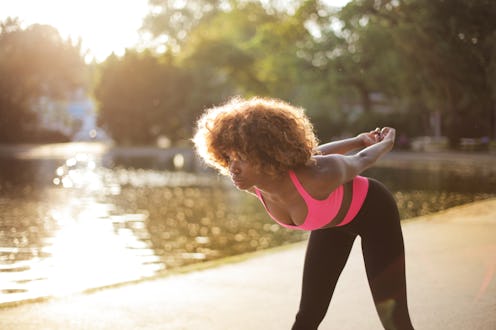Life
Here’s Exactly How Much Extra Sleep You Get After Working Out, According To New Research

Sleep is like that "friend" who's always ghosting you. You desperately want to hang out, you've been looking forward to it all day, but you just can't count on them to show up. While it's beyond frustrating, the good news is that you can get 10 more minutes of sleep at night if you work out during the day. What's more, exercising also reduces snoring, a non-peer reviewed report from the Sleep Cycle app's Sleep Cycle Institute noted.
According to a data analysis of 3 million people over a three-year period, women are only getting an average of seven hours, 18 minutes of sleep a night. What's more, women have poorer sleep quality, which means they're more likely than men to wake up on the wrong side of the bed. Overall, the report revealed that sleep is not a reliable friend. Unfortunately, sleep is not a friend you can break up with either because it's essential to your survival.
"In the research literature, we commonly see that women tend to sleep more but find their sleep less restorative than men, and are at greater risk for insomnia," natural sleep expert Dr. Catherine Darley said on Sleep Cycle's blog. "Knowing, too, the high number of women who experience sleepiness each day but push through with their activities regardless, it is not surprising that women wake with a lower mood than men."
The report noted that people who get an average of eight hours of sleep a night wake up in the best moods and are more likely to rate their sleep quality as good. If you're not getting eight hours, adding a workout to your day can get you 10 minutes closer to that goal.
A peer-reviewed study published in the journal Advances in Preventative Medicine found that there is indeed a connection between sleep and working out. "Physical exercise is an effective intervention for those who do not experience adequate sleep quantity or quality."
If you don't work out on the regular, you don't need to become a triathlete to get more sleep. The Johns Hopkins Medicine Health blog said that getting 30 minutes of aerobic exercise a day can provide immediate sleep benefits. "It’s generally not going to take months or years to see a benefit," Dr. Charlene Gamaldo, medical director of Johns Hopkins Center for Sleep at Howard County General Hospital, said. "And patients don’t need to feel like they have to train for the Boston Marathon to become a better sleeper."
Aerobic exercise doesn't have to mean a trip to the gym, and it's fairly easy to integrate it into your day. Commit to taking a walk, choosing the stairs over the elevator, or having a solo dance party in your apartment. Basically, anything that gets your heart rate up is aerobic and could help you get 10 more minutes of sleep each night.
In addition to the connection between exercise and sleep, the Sleep Cycle Institute's report also noted that the average sleeper in the U.S. goes to bed at 11:39 p.m. and gets up at 7:09 a.m., New Yorkers both stay up and wake up the latest, people in Ohio and Maryland wake up in the worst moods, Hawaiians report the worst sleep quality, Alaskans snore the most, and Vermonters spend the most time in bed and report the best sleep quality. So if you want more sleep, get active or move to Vermont. But if you don't already live in New England, it's probably easier to just go for a walk.